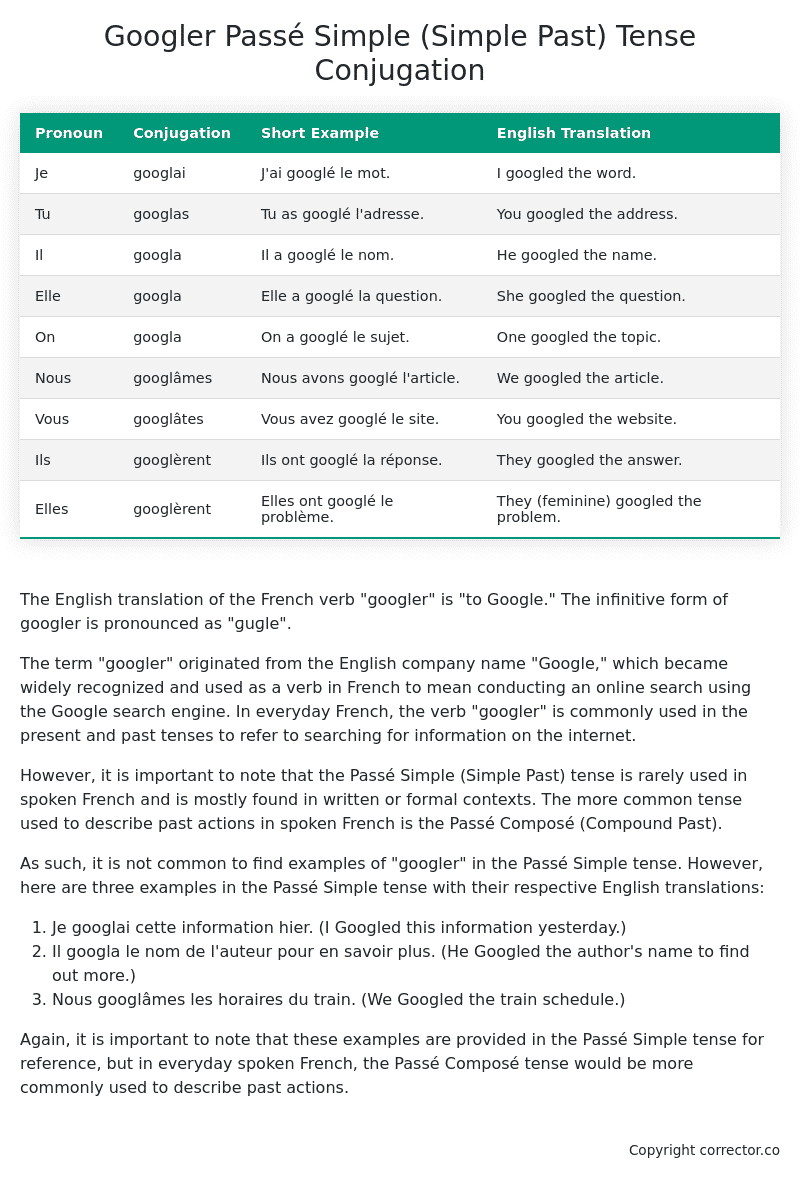Passé Simple (Simple Past) Tense Conjugation of the French Verb googler
Introduction to the verb googler
The English translation of the French verb “googler” is “to Google.” The infinitive form of googler is pronounced as “ɡuɡle”.
The term “googler” originated from the English company name “Google,” which became widely recognized and used as a verb in French to mean conducting an online search using the Google search engine. In everyday French, the verb “googler” is commonly used in the present and past tenses to refer to searching for information on the internet.
However, it is important to note that the Passé Simple (Simple Past) tense is rarely used in spoken French and is mostly found in written or formal contexts. The more common tense used to describe past actions in spoken French is the Passé Composé (Compound Past).
As such, it is not common to find examples of “googler” in the Passé Simple tense. However, here are three examples in the Passé Simple tense with their respective English translations:
- Je googlai cette information hier. (I Googled this information yesterday.)
- Il googla le nom de l’auteur pour en savoir plus. (He Googled the author’s name to find out more.)
- Nous googlâmes les horaires du train. (We Googled the train schedule.)
Again, it is important to note that these examples are provided in the Passé Simple tense for reference, but in everyday spoken French, the Passé Composé tense would be more commonly used to describe past actions.
Table of the Passé Simple (Simple Past) Tense Conjugation of googler
| Pronoun | Conjugation | Short Example | English Translation |
|---|---|---|---|
| Je | googlai | J’ai googlé le mot. | I googled the word. |
| Tu | googlas | Tu as googlé l’adresse. | You googled the address. |
| Il | googla | Il a googlé le nom. | He googled the name. |
| Elle | googla | Elle a googlé la question. | She googled the question. |
| On | googla | On a googlé le sujet. | One googled the topic. |
| Nous | googlâmes | Nous avons googlé l’article. | We googled the article. |
| Vous | googlâtes | Vous avez googlé le site. | You googled the website. |
| Ils | googlèrent | Ils ont googlé la réponse. | They googled the answer. |
| Elles | googlèrent | Elles ont googlé le problème. | They (feminine) googled the problem. |
Other Conjugations for Googler.
Le Present (Present Tense) Conjugation of the French Verb googler
Imparfait (Imperfect) Tense Conjugation of the French Verb googler
Passé Simple (Simple Past) Tense Conjugation of the French Verb googler (You’re reading it right now!)
Passé Composé (Present Perfect) Tense Conjugation of the French Verb googler
Futur Simple (Simple Future) Tense Conjugation of the French Verb googler
Futur Proche (Near Future) Tense Conjugation of the French Verb googler
Plus-que-parfait (Pluperfect) Tense Conjugation of the French Verb googler
Passé Antérieur (Past Anterior) Tense Conjugation of the French Verb googler
Futur Antérieur (Future Anterior) Tense Conjugation of the French Verb googler
Subjonctif Présent (Subjunctive Present) Tense Conjugation of the French Verb googler
Subjonctif Passé (Subjunctive Past) Tense Conjugation of the French Verb googler
Subjonctif Imparfait (Subjunctive Imperfect) Tense Conjugation of the French Verb googler
Subjonctif Plus-que-parfait (Subjunctive Pluperfect) Tense Conjugation of the French Verb googler
Conditionnel Présent (Conditional Present) Tense Conjugation of the French Verb googler
Conditionnel Passé (Conditional Past) Tense Conjugation of the French Verb googler
Conditionnel Passé II (Conditional Past II) Tense Conjugation of the French Verb googler
L’impératif Présent (Imperative Present) Tense Conjugation of the French Verb googler
L’impératif Passé (Imperative Past) Tense Conjugation of the French Verb googler
L’infinitif Présent (Infinitive Present) Tense Conjugation of the French Verb googler
L’infinitif Passé (Infinitive Past) Tense Conjugation of the French Verb googler
Le Participe Présent (Present Participle) Tense Conjugation of the French Verb googler
Le Participe Passé (Past Participle) Tense Conjugation of the French Verb googler
Struggling with French verbs or the language in general? Why not use our free French Grammar Checker – no registration required!
Get a FREE Download Study Sheet of this Conjugation 🔥
Simply right click the image below, click “save image” and get your free reference for the googler Passé Simple tense conjugation!

Googler – About the French Passé Simple (Simple Past) Tense
Formation
Usage
Narration
Historical Context
Interactions with other tenses
Passé Composé
Imparfait
Conditional and Subjunctive
Summary
I hope you enjoyed this article on the verb googler. Still in a learning mood? Check out another TOTALLY random French verb conjugation!


